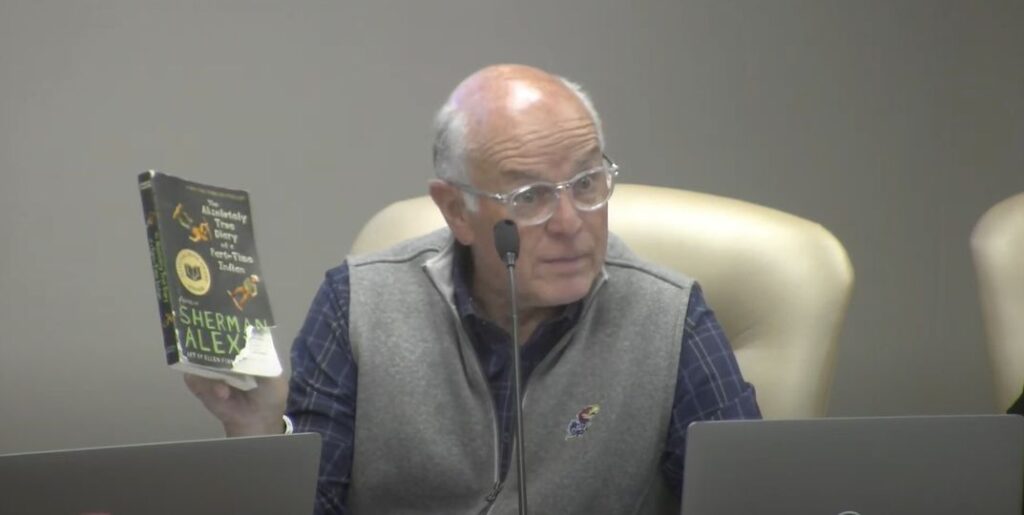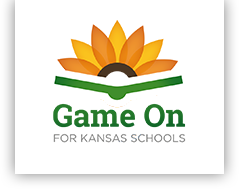At the September Kansas State Board of Education meeting, Danny Zeck went on a tirade seeking a new requirement that teachers alert parents when they will have “smut” in instructional materials. We’ll try to unpack how wrong this was from the impropriety of Zeck’s proposal to his telling either Chair Melanie Haas or counsel Mark Ferguson, “You’re full of shit” when they tried to move on after over 20 minutes of discussion. Here are some main points to take away.
1. School districts already have policies for parents to express concerns/exempt their children from reading materials they don’t like. It’s not the role of the SBOE to dictate policies to local boards. It’s called local control, and it’s especially important in this context where local boards are better able to assess and represent local community standards.
2. Zeck is uninformed about the advance notice teachers give parents of all books they are reading. If a book is part of the class curriculum, it is listed by the teacher in the syllabus, on the class website (whether that’s a general website or parent access to their student portal on sites like Canvas), and listed at Back to School Night.
3. Zeck and Dennis Herschberger (and other critics of books in schools) are inappropriately throwing around terms like pornography, smut and obscenity. Pornography is actually defined as sexually explicit material that’s primary purpose is to arouse. “The Absolutely True Diary of a Part-Time Indian” and other books in schools are not pornography, and people need to stop using that term. Zeck also repeatedly referred to “smut” in this book and others. Smut is defined as obscenity. Board member Ann Mah eventually got to speak after almost 30 minutes of discussion (on a matter not even within the board’s jurisdiction) and explained the law governing obscenity and minors. Obscenity is defined in KSA 21-6401 by a 3-part test.
(A) The average person applying contemporary community standards would find that the material or performance, taken as a whole, appeals to the prurient interest;
(B) the average person applying contemporary community standards would find that the material or performance has patently offensive representations or descriptions of:
(i) Ultimate sexual acts, normal or perverted, actual or simulated, including sexual intercourse or sodomy; or
(ii) masturbation, excretory functions, sadomasochistic abuse or lewd exhibition of the genitals; AND
(C) taken as a whole, a reasonable person would find that the material or performance lacks serious literary, educational, artistic, political or scientific value;
After reading an excerpt from the book he found objectionable, Zeck noted that the book is great and tells a great story. So, by Zeck’s own admission and by definition, that book is not obscene because taken as a whole, a reasonable person would not find it lacking in serious literary, educational or artistic value. Books in our schools, particularly in our middle and high schools, may describe realities some of our teens are experiencing and may contain sexual content, but that does not make them pornography or obscene. The books in our libraries are on the shelves because they have literary merit, have won awards, reinforce education standards, and/or reflect the variety of life experiences among a diverse student body. Some people may not want their children reading those books, but that’s why our districts have policies allowing parents to exempt their children from reading them. There is no need to ban them from all children or to warn parents about them. Parents can look at reading lists and quickly Google titles to see if there might be content they don’t like.
4. Along with books containing sexual content, Zeck voiced opposition to a book called “My Princess Boy” which is in some libraries. This book is not pornography or obscenity, but is about a boy who liked to dress up in dresses, written by a mother whose son was like the boy in the story. Zeck’s children are grown, but if he had children in school now and didn’t want them to read that book, he could tell the school librarian. Other parents don’t object to their children learning to be nice to people who are different from themselves, and some children who see themselves as different might find such a book comforting. It’s not up to the SBOE to make such decisions.
5. We hear a lot about parents rights from people who want to control not only what their children are reading, but also what other people’s children are reading. However, as was pointed out, parents already have the right to control what their children are reading and it is the parent’s responsibility to exercise those rights, to pay attention and to be involved in their children’s education. Parents do not have the right to override educators and control what all children read.
6. SBOE members need to treat each other with respect. After Zeck was given significant time to raise an issue not even properly within the role of the SBOE, he swore at the chair or counsel (it’s audible on the livestream but unclear which person he was swearing at), which is completely unacceptable.

Originally published on Facebook on Oct. 11, 2023.
